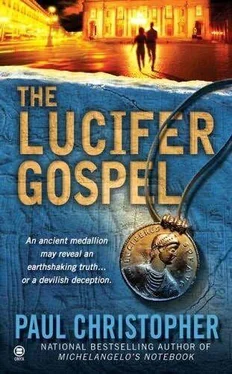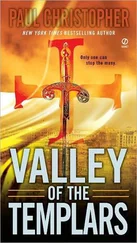Paul Christopher - The Lucifer Gospel
Здесь есть возможность читать онлайн «Paul Christopher - The Lucifer Gospel» весь текст электронной книги совершенно бесплатно (целиком полную версию без сокращений). В некоторых случаях можно слушать аудио, скачать через торрент в формате fb2 и присутствует краткое содержание. Жанр: Триллер, на английском языке. Описание произведения, (предисловие) а так же отзывы посетителей доступны на портале библиотеки ЛибКат.
- Название:The Lucifer Gospel
- Автор:
- Жанр:
- Год:неизвестен
- ISBN:нет данных
- Рейтинг книги:5 / 5. Голосов: 1
-
Избранное:Добавить в избранное
- Отзывы:
-
Ваша оценка:
- 100
- 1
- 2
- 3
- 4
- 5
The Lucifer Gospel: краткое содержание, описание и аннотация
Предлагаем к чтению аннотацию, описание, краткое содержание или предисловие (зависит от того, что написал сам автор книги «The Lucifer Gospel»). Если вы не нашли необходимую информацию о книге — напишите в комментариях, мы постараемся отыскать её.
The Lucifer Gospel — читать онлайн бесплатно полную книгу (весь текст) целиком
Ниже представлен текст книги, разбитый по страницам. Система сохранения места последней прочитанной страницы, позволяет с удобством читать онлайн бесплатно книгу «The Lucifer Gospel», без необходимости каждый раз заново искать на чём Вы остановились. Поставьте закладку, и сможете в любой момент перейти на страницу, на которой закончили чтение.
Интервал:
Закладка:
Tucker Noe threw his friend a warning glance but the taxi driver ignored him. “Lives out there all alone on Hollaback Cay, must be bored out of his skull. You and that Mills character went out to the wreck a few times, didn’t you, old man?”
“Lyman Mills? That writer?” asked Finn. “The one they used to call the poor man’s James Michener?” Lyman Aloysius Mills had virtually invented the idea of the beach bestseller. As a teenager Finn had read her mother’s creased and spine-cracked hand-me-down copies, inhaling them like hot buttered popcorn.
“Man owns a private island in the Bahamas don’t qualify as a poor man’s anything in my book,” said Sidney Poitier with a laugh.
“That Mills?” Hilts repeated.
“That’s the one,” said Tucker Noe with a nod.
30
Lyman Mills would have been a perfect example of the glamorous American success story except for the fact that he wasn’t really American; he only seemed that way. The son of a British soldier who had been cashiered for refusing to fight with the North Russian Expeditionary Force after spending three years in the trenches of France and Belgium, Mills immigrated to Canada as a child, spending much of his childhood in Halifax and then Toronto, where his father worked as a waiter and his mother ran a boardinghouse.
In a number of interviews given over the years, Mills said he could never remember a time when he hadn’t wanted to be a writer. He dropped out of school early, spent his early years as a copy boy at the Toronto Star hearing stories about Hemingway and Callahan from the previous war, and finally quit the paper to join the Royal Air Force Coastal Command, where he flew, and fell in love with, the Grumman Widgeon, a four-seater patrol flying boat that was a miniature version of the huge Pan Am Clippers that spanned the globe.
After the war, married and with a child on the way, Mills went to work for an advertising company and specialized in writing copy for liquor ads. This led to his first novel, originally entitled Aged in Oak, but eventually called The Label, an insider’s look at the workings of a huge distillery, following its fortunes over several generations, including through Prohibition. Seven hundred and eighty-eight single-spaced pages’ worth.
When half a dozen Canadian publishers turned it down as being too “racy” and “crude,” with little or no “socially redeeming content,” Mills climbed on board the overnight train to New York with the four-and-a-half-pound manuscript under his arm and sold it to the first publisher he saw on Fifth Avenue. The only suggestion his editor had was that he type double-spaced in the future for the sake of everyone’s eyesight.
Thus began Lyman Mills’s skyrocketing career as an extoller of everyday things and people, from the post office (The Letter), to automobiles (The Car), to buildings (The Tower) and the weapons industry (The Gun). One book a year, year in and year out, for three decades, stories filled with a simple formula of sex, adventure, action, and lots of interesting facts all tied together with page-turning plots. As one critic put it, “Lyman Mills may not stand the literary tests of time but he sure gets you through those hot summer days at the beach.” Reviewers scoffed and no one admitted to buying him in paperback, let alone hardcover, but somehow he wound up selling millions of copies, hard and soft, in seventy-five countries and thirty-eight languages. He wrote more than thirty instant bestsellers, all of which were made into movies or TV miniseries and in one case both. Along the way he indulged his old love and found his mistress, JS996, which he renamed Daffy after the Walter Lantz cartoon duck, a World War Two Widgeon based in Nassau during the war, and found in a Miami junkyard. Restoring the old seaplane to pristine shape became the passion of his later years, and he and his long-suffering wife, Terry, used Daffy to fly all over the Caribbean.
Then, after the death of Terry, a day before the horrible events of 9/11, Lyman Mills just quit. Physically in perfect health even into his eighties, the writer told an interviewer that the loss of his wife had broken his heart and he’d simply had enough of everything, writing included. He retired permanently to his estate on Hollaback Cay and was never seen in public again.
Hollaback Cay was a seventy-eight-acre island twenty miles south of New Providence with a main beach, its own reef, two rainwater cisterns, a 220-volt solar power generator, and a hurricane-proof harbor for sheltering large boats and Daffy the seaplane.
The house stood on a dramatic limestone outcropping on a low hill above the little harbor, facing out to sea. It was modest for a man of Mills’s means, a simple U-shaped bungalow with a narrow swimming pool in the sheltered courtyard and large open arches that brought the outside in. The walls were all in light shades, the floor cool, natural stone, and the furniture modern. There was art everywhere, Picasso, Lйger, Dubuffet, Georgia O’Keeffe, and others, all real and most of them priceless. Where there wasn’t art there were bookcases crammed with titles ranging from Simon Schama’s magnificent art-history biography Rembrandt’s Eyes to the latest John Grisham. One whole wall of the spacious living room was filled with nothing but various foreign editions of Mills’s own work, hundreds of them.
The author sat on a long canvas-colored couch and sipped a glass of iced tea brought to him by Arthur, his very British and unexpectedly Caucasian servant. Mills looked like a very well-tanned and slightly less muscular version of Sean Connery, right down to the thinning, snow-white hair, the gray beard, and the trademark jet-black eyebrows. Unlike Connery’s deep brown bedroom eyes, however, Lyman Mills’s were as blue as the seascape in front of him. His accent was different too, not British plums, Canadian twang, or American drawl, but a flat, uninflected mid-Atlantic mixture of all three. Like his writing, the voice was approachable, nonthreatening, and intelligent, a gentle baritone. He would have made a perfect announcer on National Public Radio. He wore khakis, an open-collared white cotton shirt and blue deck shoes without socks. Nothing he wore had a monogram on it and everything could have come off the rack at JC Penney.
“It’s an interesting story,” he said, putting his tea down on the big glass-and-bamboo coffee table in front of him. There was a litter of up-to-date magazines and the Book Review section from the previous week’s Sunday New York Times on the coffee table as well; Mills might be a recluse, but he was still in touch with the world. “Mind you,” he continued, “I don’t think I believed a word of it until you mentioned the name Devereaux in connection with the Acosta Star.”
“I’m not sure I understand,” said Finn.
“Just a moment.” Mills got up and left the room. He returned a few moments later carrying several thick file folders. He sat down and dumped the folders on the coffee table.
“I’ve had a lot of people try to con me over the years-I’ve been researching a book and had people outright lie to me-but one thing they always had in common was an inability to get the details right.” He smiled at them across the table. “Someone once asked Stephen King how he wrote a book and he answered ‘one word at a time.’ Never a truer word was said. It’s all in the words, the details-not so much the facts-the details. I spent the better part of ten years off and on researching the Acosta Star. It was the story I was working on when I quit. Going to call it The Ship… what else?” He smiled again. He flipped open one of the file folders, but it was obvious he knew the material by heart.
“There were three hundred and twenty passengers and a hundred and ninety-four crew members aboard the Star when she left Nassau on the sixth of September. She was supposed to sail down to San Juan, then Santo Domingo, and finally Kingston, Jamaica, before heading back to Miami. It was a standard cruise, she’d made the trip plenty of times. The fire broke out after a boiler explosion. Eight crew members were killed outright, three more in the fire. Fourteen passengers were killed and accounted for. Six just never turned up. One of them was Peter Devereaux. Nobody trying to lie to me, or just trying to pull the wool over my eyes, would have known that name or his background. Particularly since Devereaux was always one of my favorites.”
Читать дальшеИнтервал:
Закладка:
Похожие книги на «The Lucifer Gospel»
Представляем Вашему вниманию похожие книги на «The Lucifer Gospel» списком для выбора. Мы отобрали схожую по названию и смыслу литературу в надежде предоставить читателям больше вариантов отыскать новые, интересные, ещё непрочитанные произведения.
Обсуждение, отзывы о книге «The Lucifer Gospel» и просто собственные мнения читателей. Оставьте ваши комментарии, напишите, что Вы думаете о произведении, его смысле или главных героях. Укажите что конкретно понравилось, а что нет, и почему Вы так считаете.










